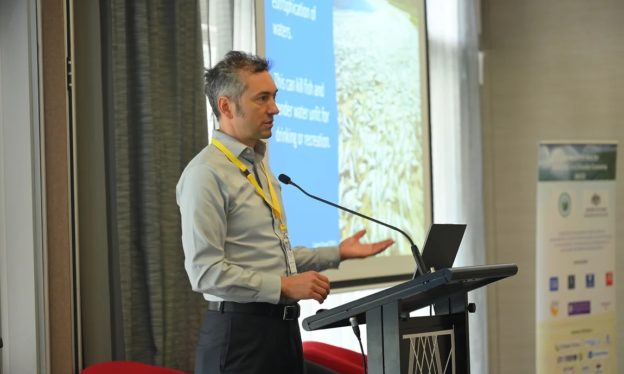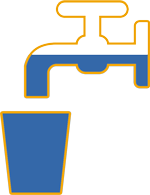Back to all articles
Abe Presents Keynote at Australia Conference on Urine Recovery

Our Research and Co-Director Abe Noe-Hays traveled to Australia to be the keynote speaker at the Circular Economy For Climate and Environment Conference, held over two days in Sydney. The conference focused on technological advances and industrial approaches for nutrient recovery from waste.
The conference was organized by Nutrients in a Circular Economy (NiCE), a research hub funded in part by the Australian Government Research Council. The NiCE hub convenes “researchers, scientists, engineers, government agencies and industry experts to develop, test and upscale new technologies to achieve nutrient recovery from waste.” The main focus of the hub is the recovery of nutrients from human urine, however, many of their industry partners are also working on the recovery of valuable nutrients from different types of waste material.
View his full keynote presentation here.
His presentation was titled “Ten Years of Urine Diversion Development in the United States: findings and lessons learned.” He shared what Rich Earth has accomplished in the past decade and the lessons we’ve learned through our experience. Then he shared our take on three of the most promising avenues for where urine diversion could be applied in the United States, addressing active practical needs that could give it footing to be widely adopted.
Niches for Sparking Urine Diversion in the United States
Just as solar panels initially gained steam in the niches of satellites and off-grid places that needed access to power, before being more widely adopted, the transition to urine diversion will start in niches identified to have greater need for this technology. Early adopter niches are contexts where there are factors at play that drive the case for urine diversion beyond the general benefits that apply anywhere. From our experience in the United States, we have identified the three core niches: preventing nutrient pollution, providing onsite fertilizer, and addressing sanitation needs.
Niche 1: Preventing pollution in watersheds particularly stricken by nutrient pollution
Cape Cod is a prime example of this niche. Due to the significant level of nutrient pollution there, Cape Cod is required by the EPA to reduce their nitrogen emissions. To achieve this via sewering, it’s going to be between $50,000 – $100,000 per house connected; a cost that will be borne by the town in general and by the homeowners. This high cost can lead to making housing unaffordable in a place where affordable housing is already hard to come by. The build out of these sewer systems will also take decades; some estimates say it will take up to 40 years to complete.
As a result of the huge problem with nutrient pollution both in ponds and the nays, a grassroots initiative to implement urine diversion on the Cape is underway. The Massachusetts Department of Environmental Protection has recommended that rather than doing a urine diverting pilot program, the town of Falmouth should skip the pilot stage and instead apply for provisional use for urine diversion. Through partners including Falmouth Freshwater Pond Coalition, the Green Center, and the Massachusetts Alternative Septic System Test Center, a urine diversion project is now underway with 43 participants who have been outfitted with Rich Earth Institute’s urine collectors.
Niche 2: Increasing food production through onsite fertilizer
In South Central Niger, the Federation of Maradi Farmers’ Unions led a farmer-to-farmer education project, helping primarily female subsistence farmers increase crop yields for their households and community. Through this project, there are now 3,000 farmers using urine as fertilizer. We take great inspiration from this project, which demonstrates the power of reclaiming urine as a free, locally available source of fertilizer to grow more food.
At Rich Earth, we run a home garden education program (Urine My Garden), helping gardeners everywhere harness the power of pee to grow a more abundant garden harvest.
Niche 3: Addressing sanitation needs through building scale systems and avoiding sewer connections
The companies Vuna and Desah are both implementing large-scale wastewater recovery systems that demonstrate the economic case for these designs that can both meet building sanitation needs and create a valuable fertilizer product.
At the Rich Earth Institute, we are providing research to inform the technologies that our spin-off company, Brightwater Tools is developing. The Brightwater system produces a concentrated and sanitized fertilizer along with a low strength effluent that can be combined with the greywater from the building. The ultimate vision for this system is that the effluent from the freeze concentrator can be combined with the greywater from sinks and showers and also treated for reuse on-site, so that the entire building can be totally enclosed. This can then enable the building to avoid connecting to a sewer system, which can be very expensive. In some cities in the United States, there is a very high cost for connection to the sewer because the sewers are overburdened or they have issues that may make new customers difficult to add. On-site treatment can provide an avenue to save hundreds of thousands of dollars by avoiding the sewer connection fee.

